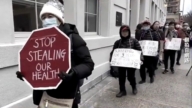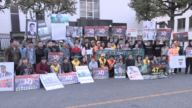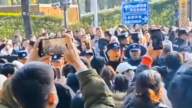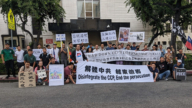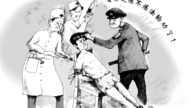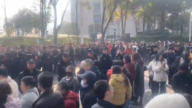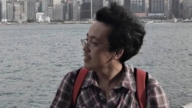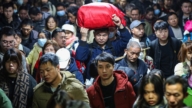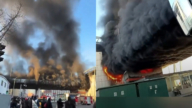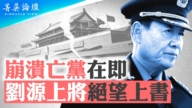【新唐人2013年06月12日讯】虽然中共法律规定,公民可以采用书信、电子邮件、传真、电话、走访等形式,向各级政府、或者县级以上政府工作部门,反映冤情或者投诉请求等等。然而针对越来越多的上访大潮,中共地方当局也建立了一套截访、拘押、劳教或送精神病院等打压的系统。大陆维权人士表示,当局不把群众提出的问题解决掉,反而把提出问题的群众解决掉。媒体认为,大多数上访者绝望之后,可能“铤而走险”。厦门公车爆炸案,爆出了“信访难民”的绝境。
6月10号,信访局官员宋军亮发表文章说,实现“零进京上访”,首要是靠严刑峻法。
有网友质疑,既然想要实现“零进京上访”,那还在北京设什么国家信访局?如果地方都依法执政了,民众有冤可诉、有理可讲的地方,谁还愿意大老远跑到京都来上访?网友还说,厦门纵火案几十条人命都没有换来官家的反思,还要再堵访民路,断他们最后一点希望,这得有多麻木?
据《德国之声》报导,厦门公车爆炸案,引发了人们对于上访人群的关注。每年至少50万人次的上访者中,大多数人再也无法回复正常生活,绝望之后或投身公益,或铤而走险。
而北京维权人士胡佳认为,如果从最低的信访单位算起,中国何止50万的上访者,每天500万人还不止。他说﹕在中国,一个很简单的冤案,当局不给解决,你就成为信访者,然后在你不断的信访过程当中,反而把你当作一个问题给解决掉,比如动用拘留、劳动教养,甚至判刑、黑监狱等。
胡佳还表示,中国没有司法独立,没有公正的司法体系,中国信访制度就是依赖人治、党治,加上共产党的政法委,那么法律与政法机关,随时都可能被共产党拿来当作开私刑的地方,警察摇身一变就是土匪。
北京维权人士胡佳:“信访不会解决任何问题,而且我确实也觉得老百姓被信访局骗了几十年了,很多人,访民后来都知道这个东西没意义,必须根本性的改变这个国家的体制。”
中国“权利运动”组织负责人胡军:“因为我们知道,你要上访的话,首先要对中共这个体制产生了质疑,你就要求公正,可是这个体制对它提出质疑,说它不好,它就把你定为反对政府,不稳定份子。当你需要去寻找公正的时候,当你需要去寻找正义、寻找真相的时候,那么你在这个体制、这个环境下,你就已经成为中共的罪犯。”
6月7号,福建厦门快速公交车爆炸案,警方在24小时内宣称﹕死者之一的访民陈水总是唯一涉嫌纵火者。不过,当局却下达禁令,要求各大媒体“不派记者采访,已派出的撤离”,其中疑点重重,令不少民众对此表示质疑。
北京维权人士胡佳:“中国政府的这些方面,拉个替罪羊,这些火速破案,这些方面都很难讲的,所以我只能说,在这次厦门事情里边,确实可能有一个信访户,也死去了,他是否是纵火者,我们现在也不知道。”
据报导,中国很多访民在经历了被推诿、辱骂、殴打、劳教和酷刑之后,大多身体残疾、精神困顿,再也无法回复正常的生活。大批上访者在北京及各省会城市沦为“信访难民”,过着极其贫困的生活。绝大多数人抱着微弱的希望,终身陷入上访与截访的回圈之中,直到“死在北京、自然结案”。
胡佳:“去年在我们通州区里边,在两会期间就发生这样的事情,通州区南街那个地方,有一个上访户就跟当地的村委会的书记,他把门反锁上,然后身上淋着汽油抱住那个人,把那个人给烧死了,两个人都死了,你把老百姓逼的无路可走,那么老百姓只好去做杨佳了。”
胡佳表示,他身边很多访民已经看透信访办的真面目,决定放弃这种重复循环、无止尽的上访路,选择走上“不归路”。
采访/田净 编辑/黄亿美 后制/郭敬
Xiamen Bus Bombing Unveils Chinese Petitioner Desperation
According to law, Chinese citizens have the right to file
grievances or complaints to local or central authorities.
They can do so through letters, email,
fax, telephone and personal presence.
Today, China is seeing a growing
number of petitioners nationwide.
Chinese Communist Party (CCP) authorities at all levels
have responded with establishing a crackdown system.
It consists of intercepting petitioners,
detention, sending them to reeducation
-through-labor camps or mental hospitals.
Rights activists highlight that the CCP authorities
have viewed these petitioners as a “problem”.
They have tried to make them disappear.
Media comment that the vast majority of petitioners take
risks, after being pushed into a corner, becoming desperate.
The Xiamen bus bombing has mirrored a real-life
extreme faced by China’s “petitioning refugees”.
On June 10, Song Junliang, an official from the
State Bureau for Petitioning, published an article.
He stated that the realization of “zero travel to Beijing for
petitioning” shall primarily impose harsh punishments.
A netizen asked, that “if the authorities aim to achieve
‘zero travel to Beijing for petitioning’, why is the
State Bureau for Petitioning headquartered there?
If local authorities implement rule-of-law governance,
will those petitioners be willing to travel from distant
regions to Beijing, to seek justice against grievances?”
Another netizen wrote, that “the bus arson
in Xiamen has caused dozens of deaths.
However, it still fails to incite the authorities’ introspection.
Now they simply continue to block
petitioners, and break their slim hopes.
How numb have these officials become now?”
Deutsche Welle reported that the Xiamen bus bombing
has brought the public’s focus onto the petitioner groups.
Each year, China sees at least 500,000
petitioners travel, in order to seek justice.
The vast majority of them have thus lost their normal life.
In despair, they may devote themselves
to defending civil rights, or take risks.
Hu Jia, a rights activist in Beijing, estimates
that the actual number of petitioners in
China has exceeded 5 million per day.
He says that today in China, a simple injustice
can force a citizen to become a petitioner.
In their later process of petitioning, the petitioner becomes
“a problem” that the CCP authorities then try to remove.
He/she may be detained, sent to the reeducation-
through-labor camps, put in prison or in a black jail.
Hu Jia adds that China has no independent
judiciary, nor has an impartial judicial system.
China’s petitioning system is based on the
rule of the CCP, of its officials, and of its
Political and Legislative Affairs Committee.
The law and judiciary organs in China can be
used at the discretion of the CCP at any time.
So it’s no surprise that the police can change
suddenly to be bandits, according to Hu Jia.
Hu Jia: “Petitioning actually solves nothing.
I think that for decades, those ordinary folks who pinned
their hopes on petitioning have been fooled by the CCP.
Lots of petitioners have now realized
that petitioning helps them with nothing.
The only solution is making a
radical change in China’s politics.”
Hu Jun, NGO Founder, Human Rights Campaign in China:
“Petitioning means that you have questioned
the CCP political system by seeking justice.
The doubts you have raised may easily put you at
risk of being accused of subversion of state power.
Thus, when you try to seek justice, to find the truth,
you’ll naturally become a ‘criminal’ for the CCP.”
On June 7, a fatal bus bombing occurred in Xiamen.
Within 24 hours, local police authorities announced
that the only criminal suspect was a petitioner.
Meanwhile, the CCP authorities issued an
order, regarding media reporting of the incident.
All major reporters are banned
from going to take local interviews.
All those who have arrived at
the scene are required to leave.
The public have found the official allegations dubious.
Hu Jia: “The Chinese authorities find a
scapegoat, or announce a quick case solving.
This may involve complicated factors.
What I can say is that there was probably
a petitioner at the scene, who also died in fire.
But whether he was the arsonist or not, we don’t know.”
Reportedly, after being abused, beaten, jailed
and tortured, lots of Chinese petitioners are
no longer able to continue their life as before.
Seeking injustice has turned large numbers
of petitioners into “petitioning refugees”.
They reside in Beijing and other
capital cities, living in extreme poverty.
The vast majority of them have held a ray
of hope, and spent their whole life in a
cycle of petitioning and being intercepted.
The cycle usually ends up with their death,
and their cases are “naturally closed”.
Hu Jia: “During the 2012 Two Session, in
Beijing’s Tongzhou district, a petitioner doused
himself with gasoline, and set himself ablaze.
He grabbed a Party chief of the
local village, and both died in fire.
When ordinary people are driven into a
corner, they have to become another Yang Jia.”
Hu Jia says that so far, many petitioners
he has known have discerned the true
colors of the CCP petitioning offices.
They have decided to withdraw from
the endless cycle of petitioning.


